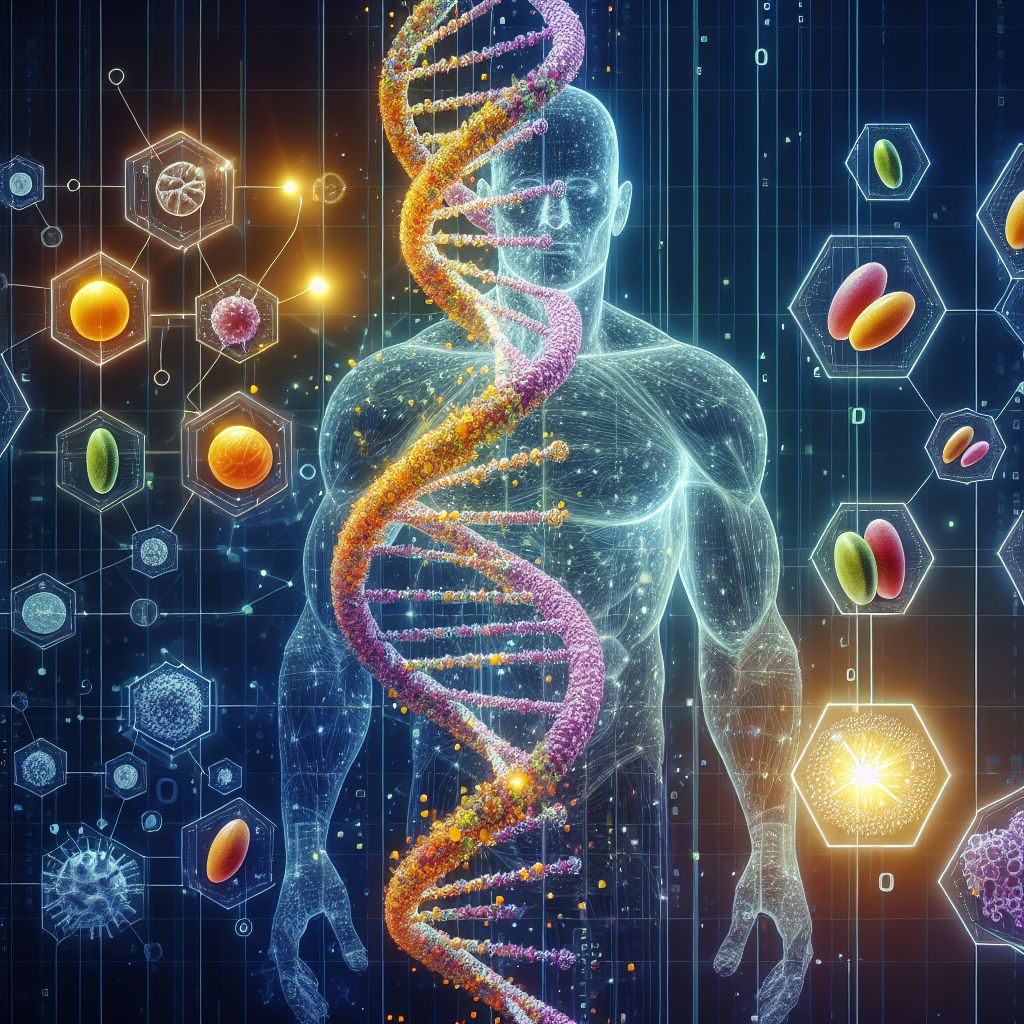Human Design and Vitamins: Personalized Health

Discover your unique Human Design and learn how personalized vitamins can enhance your health. Start your journey towards a healthier you today. Click here to get started.
Exploring the Connection Between Human Design and Vitamin Intake
Human Design, a system that combines astrology, the I Ching, Kabbalah, Hindu-Brahmin chakra model, and quantum physics, is increasingly being used to understand individual health needs. This unique approach to health and wellness is based on the belief that each person has a unique design that determines their physical, mental, and emotional needs. One area where this concept is being applied is in the field of nutrition, specifically vitamin intake.
The Human Design system categorizes individuals into four types: Manifestors, Generators, Projectors, and Reflectors. Each type has a unique way of interacting with the world and specific nutritional needs. For instance, Manifestors are believed to have a strong need for vitamins that support energy production, such as B-vitamins. Generators, on the other hand, may require a higher intake of vitamins that support muscle function and recovery, such as vitamin D and magnesium.
Projectors, who are thought to be more sensitive to their environments, may benefit from vitamins that support immune function, such as vitamin C and zinc. Lastly, Reflectors, who are believed to mirror the health of their environment, may require a broad spectrum of vitamins to ensure they are adequately nourished.
The idea of personalized vitamin intake based on Human Design is rooted in the concept of bio-individuality, which suggests that each person has unique food and nutrition needs. This concept is gaining traction in the field of nutrition and dietetics, with more practitioners recognizing the limitations of one-size-fits-all dietary recommendations.
The Human Design system provides a framework for understanding these individual needs. By understanding one’s design, it is possible to tailor a vitamin regimen that supports optimal health. For example, a Generator might benefit from a vitamin regimen that includes higher amounts of vitamin D and magnesium to support muscle function and recovery. A Projector, on the other hand, might require a regimen that includes higher amounts of vitamin C and zinc to support immune function.
However, it’s important to note that while the Human Design system can provide valuable insights into individual health needs, it should not replace professional medical advice. It’s always recommended to consult with a healthcare provider before starting any new vitamin regimen.
Moreover, while vitamins are essential for health, they are just one piece of the puzzle. A balanced diet, regular exercise, adequate sleep, and stress management are all crucial for overall health and wellbeing.
In conclusion, the Human Design system offers a unique approach to understanding individual health needs, including vitamin intake. By considering one’s design, it may be possible to tailor a vitamin regimen that supports optimal health. However, it’s important to remember that this approach should complement, not replace, professional medical advice and a balanced lifestyle.
As the field of nutrition continues to evolve, it’s likely that we will see more personalized approaches to health and wellness, including the use of systems like Human Design. By embracing these approaches, we can move towards a more holistic and individualized understanding of health, where each person is seen as unique, with their own specific nutritional needs.
Personalized Health: Tailoring Vitamin Regimens Based on Human Design

Human Design, a system that combines astrology, the I Ching, Kabbalah, Hindu-Brahmin chakra model, and quantum physics, is increasingly being used to personalize health regimens. This innovative approach to health and wellness is based on the belief that each person has a unique design that can be used to guide their lifestyle choices, including their vitamin intake.
The Human Design system categorizes individuals into four types: Manifestors, Generators, Projectors, and Reflectors. Each type has a unique way of interacting with the world and specific nutritional needs. By understanding one’s Human Design, it becomes possible to tailor a vitamin regimen that aligns with their unique needs and lifestyle.
Manifestors, for instance, are known for their ability to initiate action and make things happen. They are often energetic and active, which means they may benefit from vitamins that support energy production and muscle function, such as B vitamins and magnesium.
Generators, on the other hand, are the workhorses of the Human Design system. They have a defined sacral center, which is the body’s powerhouse of life force and work capacity. As such, they may require vitamins that support their high energy levels and stamina, such as iron and vitamin C.
Projectors, unlike Manifestors and Generators, do not have their own energy source. They are designed to guide and direct the energy of others. This means they may need vitamins that support their mental clarity and focus, such as omega-3 fatty acids and vitamin B12.
Reflectors, the rarest type in the Human Design system, are sensitive to their environment and can mirror the health of the community around them. They may benefit from vitamins that support their immune system and help them cope with environmental stressors, such as vitamin D and zinc.
However, it’s important to note that while Human Design can provide valuable insights into one’s health needs, it should not replace professional medical advice. It’s always recommended to consult with a healthcare provider before starting any new vitamin regimen.
Moreover, the quality of the vitamins one chooses to take is also crucial. Not all vitamins are created equal, and some may contain fillers, binders, and other unnecessary ingredients that can diminish their effectiveness. It’s advisable to choose high-quality, pure vitamins from reputable manufacturers.
In conclusion, the Human Design system offers a unique and personalized approach to health and wellness. By understanding one’s design, it becomes possible to tailor a vitamin regimen that aligns with their unique needs and lifestyle. This can lead to improved health, increased energy levels, and a greater sense of well-being. However, it’s important to remember that this approach should be used as a complement to, not a replacement for, professional medical advice.
The future of health and wellness is personalized, and Human Design is paving the way. By combining ancient wisdom with modern science, it offers a new perspective on health and wellness that is truly tailored to the individual. So, whether you’re a Manifestor, Generator, Projector, or Reflector, there’s a vitamin regimen out there that’s designed just for you.
The Role of Human Design in Determining Optimal Vitamin and Supplement Use
Human Design, a system that combines astrology, the I Ching, Kabbalah, Hindu-Brahmanic system, and quantum physics, is increasingly being recognized for its potential in personalized health. This system, which provides a unique ‘design’ for each individual, is believed to offer insights into one’s physical, mental, and emotional constitution. As such, it is being explored as a tool for determining optimal vitamin and supplement use, tailored to an individual’s unique needs.
The premise of Human Design is that each person has a unique energy blueprint, which can be used to understand their strengths, weaknesses, and overall health tendencies. This blueprint is determined by the position of the stars and planets at the time of birth, and it is believed to influence everything from personality traits to physical health.
In the context of vitamins and supplements, the Human Design system suggests that each individual may have different nutritional needs. For instance, some people may require higher levels of certain vitamins due to their unique energy blueprint, while others may be more susceptible to deficiencies in certain minerals. This personalized approach to nutrition is a departure from the one-size-fits-all approach that has dominated the health and wellness industry for decades.
The potential benefits of this approach are significant. By tailoring vitamin and supplement use to an individual’s unique Human Design, it may be possible to optimize health and wellbeing, prevent deficiencies, and even address specific health concerns. For instance, someone with a predisposition towards low energy levels may benefit from supplements that support energy production, while someone with a tendency towards anxiety may benefit from supplements that support the nervous system.
However, it’s important to note that while the Human Design system offers valuable insights, it should not replace professional medical advice. Vitamins and supplements can have powerful effects on the body, and it’s essential to use them responsibly. Always consult with a healthcare provider before starting any new supplement regimen, especially if you have existing health conditions or are taking other medications.
Moreover, while the Human Design system can provide guidance on what vitamins and supplements may be beneficial, it’s also crucial to consider other factors such as diet, lifestyle, and overall health. A balanced diet rich in whole foods is the foundation of good health, and supplements should be used to complement, not replace, a healthy diet. Similarly, lifestyle factors such as exercise, sleep, and stress management play a crucial role in overall health and wellbeing.
In conclusion, the Human Design system offers a promising tool for personalized health, particularly in the realm of vitamins and supplements. By providing a unique energy blueprint for each individual, it may be possible to tailor supplement use to meet specific nutritional needs, optimize health, and prevent deficiencies. However, it’s important to use this tool responsibly, in conjunction with professional medical advice and a balanced approach to diet and lifestyle. As our understanding of the Human Design system continues to grow, it’s exciting to consider the potential it holds for personalized health and wellbeing.